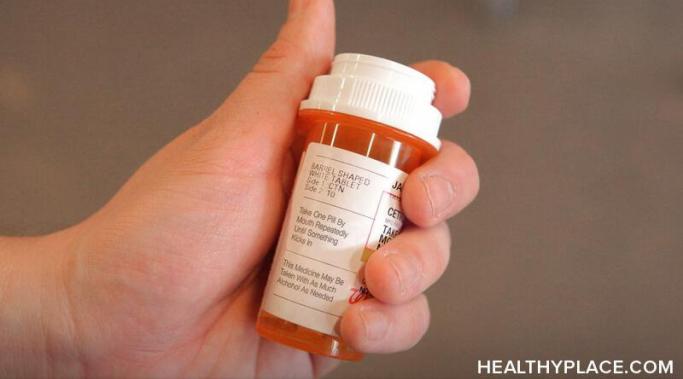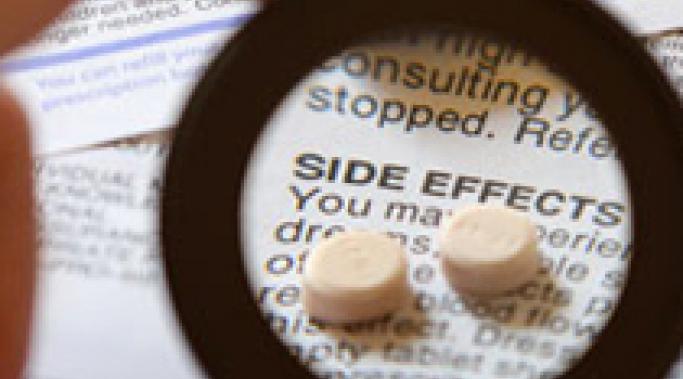Sometimes it feels as if your body isn’t yours because of bipolar medication. It feels like the medication takes over your very being. It feels like you no longer have a human body but, rather, a collection of drug-related effects. This particularly happens when you’re getting on medications or tapering off medications, but really, bipolar medication can make you feel like your body is not your own at any time.
Medication Side-Effects
So often during the day I tell myself to, "Calm down," but this isn't because I'm buzzing around my apartment, it's because of my bipolar inner restlessness. Telling me to calm down would be natural if I was climbing the walls, but sitting still on my couch doesn't seem to be the time to do it. And yet, I do it all the time. It's very real and very necessary. Inner restlessness in bipolar disorder is real and it's necessary to know how to deal with it.
I am suffering through a long bout of bipolar medication side effects. Side effects, withdrawal effects, call them what you like, they are caused by the use of medication. And I am white-knuckling it. I know that, in my case, there are no options better than this very sucky one. But I tell you, I hate suffering through bipolar medication side effects.
Recently, I’ve lost my ability to become sexually aroused/experience sexual pleasure because of my bipolar medication. You’d think of all the possible side effects, this wouldn’t be that bad. After all, I could be constantly dizzy and nauseous, gaining weight or having blood sugar/pressure problems. So, loss of sexual arousal/pleasure because of bipolar medication must be a walk in the park then. Well, I’m not finding it that way.
When you’re changing medications, it becomes very clear how much bipolar medication changes suck. Being on the first one(s) sucks and changing to the next one(s) sucks, too. And people not on medication may not get this. They may not get what it’s like to have to take medication for bipolar and they certainly may not get why bipolar medication changes suck.
I have always said bipolar medications cannot make you less intelligent. Now, I’m not saying they can’t impact how you think or your speed of thought and so on, what I’ve always said is that bipolar medications can’t actually harm your intelligence quotient (IQ). All that being said, a new medication I’m on, sure makes me feel stupid. The question is, what to do when bipolar medications make you seem less intelligent?
The idea that bipolar medication side effects suck is not a new idea. I am not the first person to mention this nugget. This is something every person with bipolar disorder who is on medication knows. In fact, when it comes to every medication, side effects suck. The reason why bipolar medications stand out for me is, of course, I take them, but not only that, they are medications that most of us have to take for the rest of our lives. When bipolar medication side effects suck, they suck for a very, very long time, so why take bipolar medications?
Let’s face it, side effects happen to almost everyone who takes medication for bipolar disorder. Bipolar medication side effects can range from annoying, to painful, to downright intolerable. But how does one deal with bipolar medication side effects?
As many of you have heard by now, the drug ketamine is being investigated as an antidepressant. Yes, the drug known on the street as “Special K” causing it’s users to fall into a “k-hole” is being researched for clinical, antidepressant use. Ketamine has shown promise both in unipolar and bipolar depression.
There are many problems with ketamine, though, not the least of which being that it’s a scheduled substance in the United States and thus very hard to get your hands on. It can be done but it’s awfully pricey. There are also substantial side effects like hallucinations to worry about. (Ketamine is typically used as an anaesthetic in medicine.)
Luckily, there is a chemical cousin of ketamine on the horizon that appears to work in a similar way to ketamine but without all the unfortunate side effects.
People with bipolar disorder, regardless of medication, are, on average, heavier than the average person. This is likely due to sedentary lifestyles and poor dietary choices due, in part, to reduced income. I suspect it’s also because of untreated and undertreated people exhibiting major depression and never getting off the couch (something I know a lot about).
But then, of course, there are the side effects from medication and one of the big ones that effects people drastically is weight gain. Antipsychotics, in particular, can make a person put on a lot of weight and fast. (Tip: the antipsychotic that was newly approved in bipolar disorder, lurasidone, has been shown to be weight-neutral.)
And while many people work very hard to try to lose it, the fact of the matter is, most can’t. Losing weight is something that is tough in the average population let alone in a medicated one. So sometimes, acceptance is the only answer.









